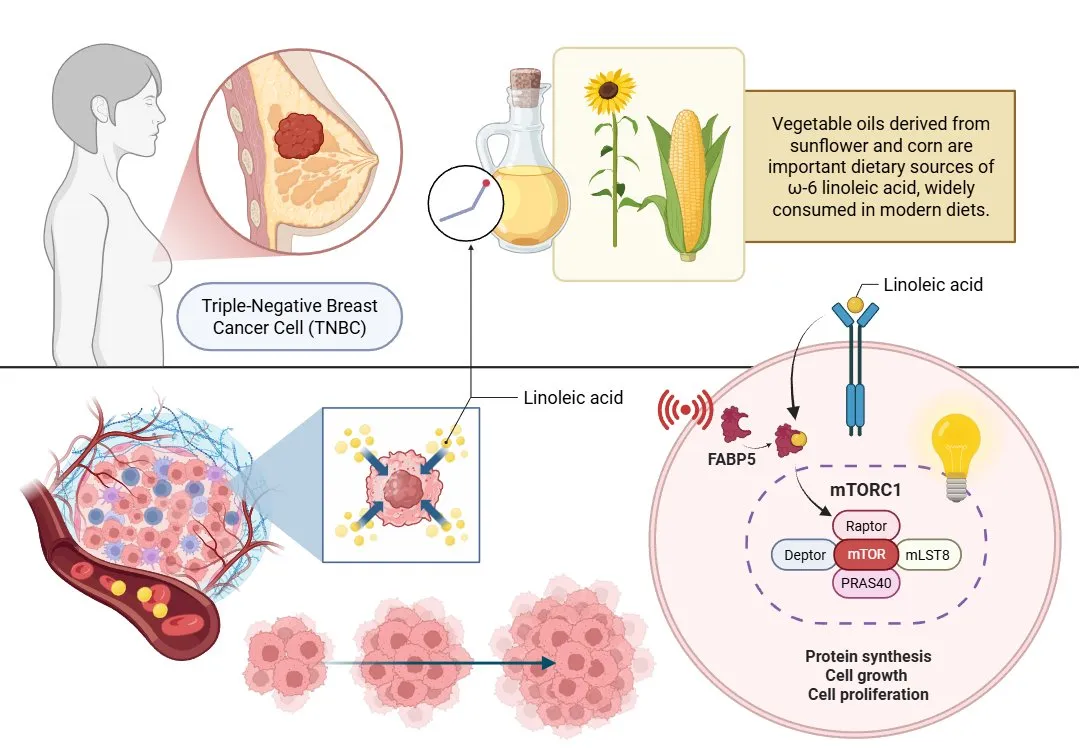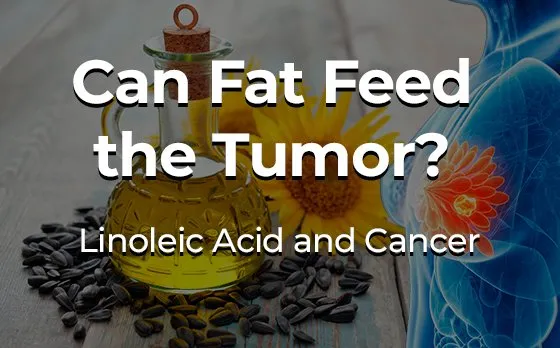Our body needs nutrients to function: proteins, sugars, fats. However, not all nutrients act innocently. A new study published in Science by the research team led by Nikos Koundouros and collaborators has discovered that a very common fat in our diet may have an unexpected effect on certain types of breast cancer.
This fat is linoleic acid, a type of omega-6 fat found in vegetable oils such as safflower, corn, sunflower, and in a wide variety of processed foods. Although our body needs small amounts of this fat for essential functions, such as maintaining skin integrity and regulating inflammatory processes, excess intake could be a problem. This study shows that some breast cancer cells, especially those of the type called triple-negative breast cancer (one of the most aggressive and difficult to treat), not only use this fat as an energy source, but also detect it directly as a signal to grow faster.
How does this happen? Inside our cells, there is a kind of “control center” that decides whether the cell should grow, multiply, or stop. This center is called mTORC1, a complex protein that responds to nutrients like proteins and sugars, turning cellular growth on or off as needed. What the researchers discovered was something new: linoleic acid can also directly activate mTORC1, promoting the proliferation of tumor cells.
The “messenger” responsible for carrying this signal is a protein called FABP5. Inside the cell, FABP5 works like a hand that picks up linoleic acid and transports it to mTORC1, triggering the growth-promoting signals. The researchers found that when they blocked the action of FABP5, the cells could no longer use linoleic acid to activate mTORC1 or to grow at an accelerated rate.
To confirm their findings, they conducted experiments in mice. They fed some of the mice diets rich in linoleic acid (simulating a diet high in processed vegetable oils) and observed that tumors in these animals grew faster, formed larger masses, and showed greater mTORC1 activity inside. In contrast, mice fed healthier fats, such as omega-3s, did not show this increase in tumor growth. This suggests that the type of fat consumed can have a direct effect on the speed of tumor expansion.
Moreover, by analyzing blood and tissue samples from human patients, they found elevated levels of linoleic acid and FABP5 in triple-negative breast cancer tumors, suggesting that this metabolic pathway is also active in real life, not just in laboratory models.

Figure 1. Linoleic acid (ω-6) from dietary sources reaches triple-negative breast cancer (TNBC) cells, where it binds to FABP5 and directly activates mTORC1, promoting protein synthesis, cell growth, and tumor proliferation.
This discovery suggests that what we eat can directly influence the behavior of certain types of cancer. Especially in triple-negative breast cancer, a diet high in omega-6 fats could, in theory, promote tumor growth. Additionally, the FABP5 protein could in the future become a biological marker to identify which tumors are more sensitive to this type of fat, or even a new therapeutic target to stop disease progression.
Beyond this specific finding, the study invites us to reflect on the powerful connection between nutrition and health. It is not about becoming alarmed or demonizing foods, but about remembering that our daily habits, even what we choose to put on our plate, can have a much deeper impact than we usually imagine.
Main Reference:
Koundouros, N., Nagiec, M. J., Bullen, N., Noch, E. K., Burgos-Barragan, G., Li, Z., He, L., Cho, S., Parang, B., Leone, D., Andreopoulou, E., & Blenis, J. (2025). Direct sensing of dietary ω-6 linoleic acid through FABP5-mTORC1 signaling. Science (New York, N.Y.), 387(6739), eadm9805. https://doi.org/10.1126/science.adm9805
Other References:
Kim, S. G., Buel, G. R., & Blenis, J. (2013). Nutrient regulation of the mTOR complex 1 signaling pathway. Molecules and cells, 35(6), 463–473. https://doi.org/10.1007/s10059-013-0138-2
Saxton, R. A., & Sabatini, D. M. (2017). mTOR Signaling in Growth, Metabolism, and Disease. Cell, 168(6), 960–976. https://doi.org/10.1016/j.cell.2017.02.004
Lee, G., Zheng, Y., Cho, S., Jang, C., England, C., Dempsey, J. M., Yu, Y., Liu, X., He, L., Cavaliere, P. M., Chavez, A., Zhang, E., Isik, M., Couvillon, A., Dephoure, N. E., Blackwell, T. K., Yu, J. J., Rabinowitz, J. D., Cantley, L. C., & Blenis, J. (2017). Post-transcriptional Regulation of De Novo Lipogenesis by mTORC1-S6K1-SRPK2 Signaling. Cell, 171(7), 1545–1558.e18. https://doi.org/10.1016/j.cell.2017.10.037


